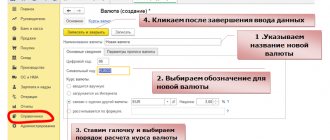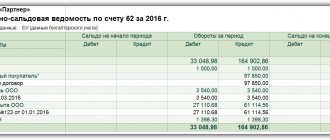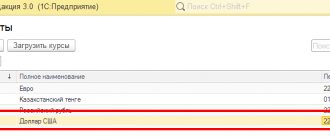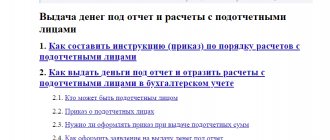Introductory information
In civil legislation there is a rule according to which the use of foreign currency, as well as payment documents in foreign currency when making payments on the territory of the Russian Federation, is permitted in cases, in the manner and under the conditions determined by law (clause 3 of Article 317 of the Civil Code of the Russian Federation). That is, the use of foreign currency is, in principle, allowed. But only in cases that are expressly provided for by law. Therefore, for different types of legal relations it is necessary to analyze different legal norms. Let's look at specific examples.
Converting salaries into foreign currency
Let us immediately draw attention to two important provisions of labor legislation: 1. Terms of remuneration (including the size of the tariff rate or official salary, additional payments, allowances and incentive payments) must be included in the employment contract (Part 1 of Article 57 of the Labor Code of the Russian Federation) ; 2. Payment of wages is made in cash in the currency of the Russian Federation, that is, in rubles (Article 131 of the Labor Code of the Russian Federation).
However, there is no prohibition on setting the payment in currency (for example, dollars or euros). It turns out that you can pay wages in rubles, for example, at the dollar exchange rate on the day of payment.
Risks
If we talk about risks, then it is worth mentioning one more requirement of the Labor Code of the Russian Federation: “the employer is obliged to provide employees with equal pay for work of equal value” (paragraph 6, part 2, article 22 of the Labor Code of the Russian Federation). It would seem, how does this relate to currency? However, imagine that one employee has a salary in euros, and another in rubles. With the same functionality at the end of the month, they should, in theory, receive the same amount. But if the exchange rate changes, it may turn out that ruble earnings will differ significantly.
By the way, official bodies also believe that setting wages not in rubles does not comply with labor legislation and infringes on the rights of workers (letter of Rostrud dated March 11, 2009 No. 1145-TZ). The rationale is this: a change in the exchange rate of the ruble against a foreign currency can lead to a deterioration in the employee’s remuneration conditions (for example, if the exchange rate depreciates and wages in rubles become less).
In this regard, setting wages in foreign currency is dangerous. It cannot be completely ruled out that the employer may be held administratively liable under Art. 5.27 of the Code of Administrative Offenses of the Russian Federation (which provides for fines or suspension of activities).
How to accept currency and not pay a fine
Many capital companies work with cash. Quite often, consumers want to pay for goods in foreign currency. At the same time, company employees, as a rule, commit many violations. And inspectors identify this during test purchases.
No one is safe
The main task of any company is to correctly and successfully organize sales and attract as many customers as possible. They simultaneously act as a source of income as well as risk. It is often very difficult to distinguish employees of regulatory (law enforcement) agencies from clients. This is what government officials take advantage of during a test purchase, the purpose of which is obvious – to find violations and use them against the company. In this case, it is not surprising that the police carry out test purchases in such a way that the company’s employees commit violations.
By the way, recently there has been a widespread belief that inspectors only come to make test purchases to those enterprises whose clients are citizens. However, this is not the case. They can come to absolutely any company with such a check.
In the service sector, quite often consumers want to pay for goods or services in currency. For example, in restaurants there are often visitors who tell the manager: “Everything is very tasty, I’m ready to pay for dinner, but the money in my pocket is only American, let me pay with it.” But this problem is not only for service companies, but also for manufacturing ones (for example, construction companies). It even happens that the organization’s employees themselves (executives, accountants, managers) provoke such proposals from clients, drawing up price lists both in rubles and in conventional units. And a lot will depend on how you behave in a situation where a potential customer offers to pay in foreign currency. Including the safety of the company as a whole.
The contract is different from the contract
The first thing that a manager and accountant needs to remember is that the company will always have enough ill-wishers and competitors. Therefore, you should not give in to provocation when a client offers currency. If the company has not prepared itself in advance, then it is better not to accept cash dollars from a dubious consumer. After all, it is cheaper to lose one client than to solve problems with the government later.
The best option for an organization is to think through a plan of action in such situations in advance. Different industries have different schemes for how to legally accept foreign cash. But first, let’s give some erroneous options that entrepreneurs often use in practice.
When a client wants to pay for goods in dollars, some firms mistakenly use an agreement between two citizens. The essence of the agreement is that the company employee provides services independently, and not on behalf of the company. Indeed, the scheme works, but only if the company faces a fine for not using a cash register. The fact is that foreign currency cannot be used as a means of payment. In Article 9 of Law No. 173-FZ of December 10, 2003, legislators expressly prohibit such operations. For this, inspectors can fine an accountant, manager or company in the amount of 3/4 to one of the amounts of the illegal transaction (Clause 1 of Article 15.25 of the Administrative Code).
The second option - to say that the currency that the inspector handed over was received by the company (employee) as a loan - also does not comply with the law. Firstly, it is unlikely that a police officer will sign a loan agreement during a test purchase (and without it, in most cases, the transaction will be invalid). Secondly, foreign currency loans between citizens are also prohibited by Law No. 173-FZ. The Ministry of Finance specifically drew attention to this in its letter dated December 2, 2004 No. 07-02-04/33.
“I instruct you...”
Of course, there is a way out of any situation. We will talk about two schemes that firms use in practice and which have proven to be effective. The first, and most advantageous, is most preferable for small and medium-sized businesses. Companies here do not engage in currency transactions very often. The purpose of this scheme is to protect against test purchases. It consists in the fact that the client enters into an agency agreement with a representative of the company.
By agreement, an accountant, salesperson or other employee. This operation is regulated by Chapter 49 of the Civil Code. That is, within the framework of the law. In this case, foreign currency acts as the subject of a transaction, and not as a means of payment.
In such cases, police officers, as a rule, look with a smile (and annoyance in their hearts) at an A4 sheet, in the upper part of which is the text of the contract of assignment (3-5 sentences), and in the lower part is a receipt for receiving money (1-2 sentences ). This scheme has been tested many times in the restaurant business, trade and other activities. The main thing here is to correctly draw up the agency agreement and the receipt form, which will be an appendix to the agreement.
Cash desk for euros
The second scheme is more applicable in medium and large businesses, where payments in cash are more likely. In this case, the company can organize an operating cash desk on its territory outside the cash desk (operatkassa). The essence of this method is as follows. By agreement with the bank (for example, under a simple partnership agreement in accordance with Chapter 55 of the Civil Code), the company organizes a specially equipped and protected room on its territory and transfers it to the bank for organizing an operating cash desk. In this case, if the client wants to pay in euros or dollars, the bank employee accepts the currency, converts it into rubles and, without opening a bank account, transfers the money to the company's current account.
This opportunity for banks is provided for by Central Bank Regulation No. 199-P dated October 9, 2002. Moreover, on September 5, 2003, the Central Bank specifically issued letter No. 31-1-2/1864, in which it indicated the possibility of carrying out such operations.
This method has many advantages. Firstly, the likelihood of a test purchase with cash currency is reduced to almost zero (no one will check the functionality of the cash desk). Secondly, the company officially provides its clients with additional services for carrying out banking operations (including in the form of accepting foreign currency).
In addition, the operating cash desk itself is a bank premises, not a company premises. Consequently, if they come to the company with an inspection, this will not affect the cash desk, because they are checking the company, not the bank. A credit institution requires a separate resolution and permission from the State Technical Directorate of the Bank of Russia. In any case, it is not easy for a policeman or other inspector to enter the territory of the cash desk. Indeed, according to Appendix No. 1 of the Central Bank Regulation No. 199-P dated October 9, 2002, it must be technically strengthened. This means that it is enough to close the door and not open it during inspection. But this method also has its disadvantages. The company must allocate a special place for the cash register. And the costs of its maintenance are not affordable for all companies.
If an accountant, salesperson or other employee accepted foreign cash from an inspector, call a lawyer or attorney as soon as possible. In all documents (protocol, control purchase act, etc.) write: “I have read the document, but essentially do not agree.” Contact the tax office (police) only through a lawyer. But it’s better, of course, not to let it come to that.
Vladlen LABZENKO, General Director
Setting currency prices in contracts
Some Russian suppliers have recently begun to offer their customers to switch to payments in foreign currency. However, as a general rule, currency transactions between residents are prohibited (Article 9 of the Federal Law of December 10, 2003 No. 173-FZ “On Currency Regulation and Currency Control”). For illegal currency transactions, Rosfinnadzor may fine the manager or chief accountant in an amount ranging from three-quarters to one of the transaction amount (Part 1, Article 15.25, Article 23.60 of the Code of Administrative Offenses of the Russian Federation).
Civil legislation provides that payments on the territory of the Russian Federation are carried out in rubles (Article 140, paragraph 1 of Article 317 of the Civil Code of the Russian Federation). At the same time, in paragraph 2 of Art. 317 of the Tax Code of the Russian Federation states that a monetary obligation can be paid in rubles in an amount equivalent to a certain amount in foreign currency or in currency. e.. In this case, the amount payable in rubles is determined at the official exchange rate of the relevant currency or y. e. on the day of payment, unless a different rate or another date for its determination is established by law or by agreement of the parties.
This means that between organizations (or entrepreneurs) the price in the contract can be set in currency or ye. In this case, the contract can agree on the rate at which the price will be converted into rubles. If there is no such agreement, then the official rate will apply. In this regard, significant fluctuations are possible in ruble terms.
Why changes are needed by Mastercard
Mastercard could take this step, as various fintech solutions appeared on the market with favorable conditions for converting currencies on cards, which competed with international payment systems (IPS), explains Rakova. “Mastercard will gain a short-term competitive advantage, but most likely other MPS will follow its example,” she concluded.
The question remains open of who should bear the risks in the event of a sharp jump in the exchange rate, argues Obaeva: “Previously, it was believed that the card holder himself should pay for this. Mastercard has decided to change this rule, but it is unlikely to shift the risk to the merchant. Most likely, they will be taken over by banks or the payment system itself.”
Price tags in e. or currency
Let's assume that the seller decides to indicate prices in currency or conventional units. However, information about goods (works, services) must necessarily contain the price in rubles. This is the requirement of paragraph 4, paragraph 2, art. 10 of the Law of the Russian Federation dated 02/07/92 No. 2300-1 “On the protection of consumer rights.”
At the same time, regarding the question of indicating prices in foreign currency or currency. e. there are different approaches. On the one hand, Rospotrebnadzor (Information dated December 17, 2014) does not exclude the possibility of establishing the contract price in rubles in an amount equivalent to a certain amount in foreign currency (cu).
On the other hand, there are precedents in judicial practice when indicating prices in foreign currency or currency. e. was recognized as contrary to the requirements of the legislation on the protection of consumer rights (see, for example, resolution of the Federal Antimonopoly Service of the Ural District dated March 13, 2007 No. F09-1474/07-S1). And for this, administrative liability is possible on the basis of Article 14.8 of the Code of Administrative Offenses of the Russian Federation. In this regard, setting prices in currencies or conventional units is quite risky.
Agreement in foreign currency: tax consequences
USN and cash method
Let’s assume that an organization using the simplified tax system has entered into an agreement for the supply of goods with another organization. The contract specified the cost in dollars and payment in rubles.
When “simplified”, the date of receipt of income is the day of receipt of funds (clause 1 of Article 346.17 of the Tax Code of the Russian Federation). That is, it turns out that the price specified in the contract in dollars does not matter. The tax will need to be calculated based on the ruble amount received.
The situation is similar with income tax when applying the cash method - income is also determined on the date of receipt of funds (clause 2 of Article 273 of the Tax Code of the Russian Federation). Income is recognized in the same way under the Unified Agricultural Tax (clause 5 of Article 346.5 of the Tax Code of the Russian Federation). That is, differences in exchange rates are, in fact, not taken into account.
Exchange differences for income tax
Before 2015, amount differences could arise when calculating income tax. This happened when the foreign currency exchange rate was different on the date of recognition of income (expenses) and on the date of actual receipt of funds. Depending on the fluctuation of the exchange rate, receipts or expenses should have been reflected in non-operating income or expenses (clause 11.1, part 2, article 250, subclause 5.1, clause 1, article 265 of the Tax Code of the Russian Federation).
However, from January 1, 2015, the concept of “amount differences” is no longer used in tax accounting. Differences that arise when making payments under contracts in foreign currency or currency. That is, they must be taken into account as coursework. For more details, see “Starting 2015, tax and accounting rules will be closer to each other.”
Note that exchange rate differences arise when revaluing and depreciating obligations and claims denominated in foreign currency (if the exchange rate changes). Thus, since 2015, the value of claims (obligations) expressed in foreign currency is recalculated into rubles at the official rate established by the Bank of Russia, or at another rate determined by law or agreement of the parties, on the date of termination (fulfillment) of claims (obligations) and (or) on the last day of the current month, depending on which date came earlier (clause 8 of Article 271, clause 10 of Article 272 of the Tax Code of the Russian Federation).
VAT deductions and invoices
If the purchased goods are intended for use in transactions subject to VAT, then the buyer, if there is an invoice, has the right to accept the amount of “input” VAT for deduction after accepting the goods for registration (clause 2 of Article 171, paragraph 1 of clause 1 of Article 172 of the Tax Code RF). However, the amounts of VAT that are accepted for deduction are not adjusted if the cost of goods established in foreign currency is paid in rubles (paragraph 5, clause 1, article 172 of the Tax Code of the Russian Federation).
Positive or negative differences in the amount of VAT that arise for the buyer when paying should be taken into account as part of non-operating income or expenses on the basis of Article 250 or Article 265 of the Tax Code of the Russian Federation (paragraph 5 of clause 1 of Article 172 of the Tax Code of the Russian Federation).
Special mention should be made about the preparation of invoices. The fact is that the name of the currency is a mandatory detail of the invoice (clause 6.1, clause 5, clause 4.1, clause 5.1, article 169 of the Tax Code of the Russian Federation). The name of the currency and its digital code are indicated on line 7 of the invoice. For example, when issuing an invoice in rubles, line 7 of the invoice must be filled out as follows: “Russian ruble, 643.”
An invoice can be drawn up in a foreign currency only if the goods (work, services) are paid for in the same currency (Clause 7, Article 169 of the Tax Code of the Russian Federation). So, if the invoice is issued in euros or dollars, then in this line you should indicate: “euro, 978” or “US dollar, 840”. But issuing an invoice in . i.e., in principle, not provided for.
In this regard, if the agreement is drawn up in currency or conventional units, and payments are made in rubles, then the invoice should be issued in the currency of the Russian Federation (since the tax base is calculated in rubles, clause 4 of Article 153 of the Tax Code of the Russian Federation).
Source documents
Please note: monetary measurement of accounting objects is carried out in the currency of the Russian Federation (Part 2 of Article 12 of the Federal Law of December 6, 2011 No. 402-FZ “On Accounting”). If, for example, salaries in foreign currency are reflected in the primary documents, then problems with the recognition of labor costs when calculating income tax cannot be ruled out. To recognize such expenses, we recall that the expenses must be documented (Article 255 of the Tax Code of the Russian Federation). It is possible that inspectors will consider the primary documents filled out “in foreign currency” to be inconsistent with the legislation of the Russian Federation. This may lead to problems with the deduction of VAT.
Rules of other PS
According to Visa rules, currency conversion occurs on the processing date, i.e.
date of receipt of the Visa clearing entry. The conversion itself can be done either at the market rate or at the rate set by the government agency that regulates it. According to the standards of the Mir payment system, there are two possible options for applying the conversion rate for cross-border transactions: for intersystem interaction, conversion occurs at the rate established at the time of authorization; in standard interaction with foreign participating banks - at the rate established on the operational day of clearing processing.
NSPK is not currently discussing plans to change this procedure, a company spokesman said. Visa said it does not comment on rule changes before they come into force.









